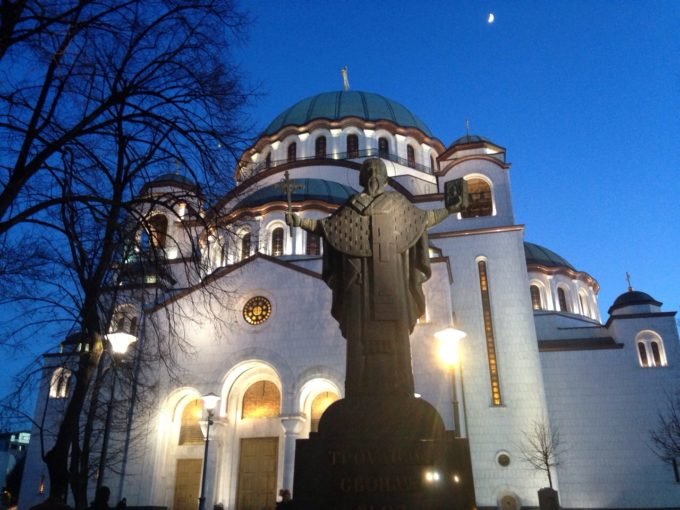
An American, a Brit, and six Serbian nationalists in a bar

An American, a Brit, and six Serbian nationalists in a bar
Šljivovica in Belgrade
“American,” shouted the Bread Man, a name given to him by the patrons at this shabby boat-bar on the Danube in the Belgrade suburb of Zemun.
He punched his open palm, and then, shaking his head, handed me a scribble of bombs being dropped over the United States and, along with it, yet another shot of šljivovica, a plum-flavored rakija.
“Živeli,” he toasted, and we downed the Serbian moonshine.
It couldn’t have been much after noon, and our table, an American, a Brit, and six Serbian nationalists, was already chasing our shots of rakija with additional shots of rakija.
We had seemingly been invited to sit with the group to be verbal punching bags for these staunchly right-wing men, who wanted to talk about “the unjust NATO bombings” inflicted on Belgrade in 1999. Each man, in turn, talked about the destruction of bridges, factories, and homes—all the fault of President Bill Clinton.
The Serbian government estimates that some 2,500 people perished and another 13,000 were injured during the 78 days of bombing. It’s also estimated that 25,000 houses, 300 miles of roads, and 370 miles of railroads, including the bombing of the Grdelica passenger train, were destroyed during the NATO campaign.
To the men at this table, the country has yet to recover.
“Živeli!”
Drink. Repeat. And, in typical Serbian custom, another full glass almost magically re-appeared.
Rakija, to the Serbs, is a healer. Distilled from quite literally anything containing natural sugar—be it fruits, nuts, or even just juniper—the potent elixir is known to cure everything from colds and coughs to relationships. In Serbian folklore, it is known as medicine for the old and a demon for the young, and it’s presumed to have mended relations between Serbian Orthodox Saint Sava and the devil.
“You come to my house,” said the Bread Man.
My friend and I followed. At the door, we were greeted by his wife, who, seemingly not at all surprised by her husband’s drunken impulses, immediately rushed to their cellar for some šljivovica, distilled right from the plums in their garden. With it, she brought jars of fresh ajvar made from her pepper plants, a bowl of cheese, slices of ham, and some fresh bread her husband had baked that morning.
Their son joined, bringing with him a bottle of his bathroom rakija distilled from leftover chocolate scraps. Along came their daughter. All of us crammed into a kitchen barely big enough for two.
As the bread and ajvar soothed the burns from the homemade hooch, their son talked about his math studies and daughter about her dreams to study abroad. Their father, the Bread Man, smiled and took photographs, while the mother poured us all two more glasses of rakija.
“Živeli,” she toasted.
Once more, we drank.
Up Next
A Sad Song for the Slavic Soul
Queer as Turbofolk
A gay club in Belgrade embraces Serbia’s local pop music in all of its macho, misogynistic glory.
17 Things to Know Before You Go to Belgrade
The Serbian capital has seen a thing or two. From pork and coffee to Attila the Hun, the essentials for enjoying and understanding the White City.
A Flaky, Oily, Meaty Hangover Cure
Burek in Montenegro.
A New Day for Kosovo (Perhaps)
Video of Roads & Kingdoms’ first interview with a head of state: Kosovo’s Prime Minister Hashim Thaçi.






